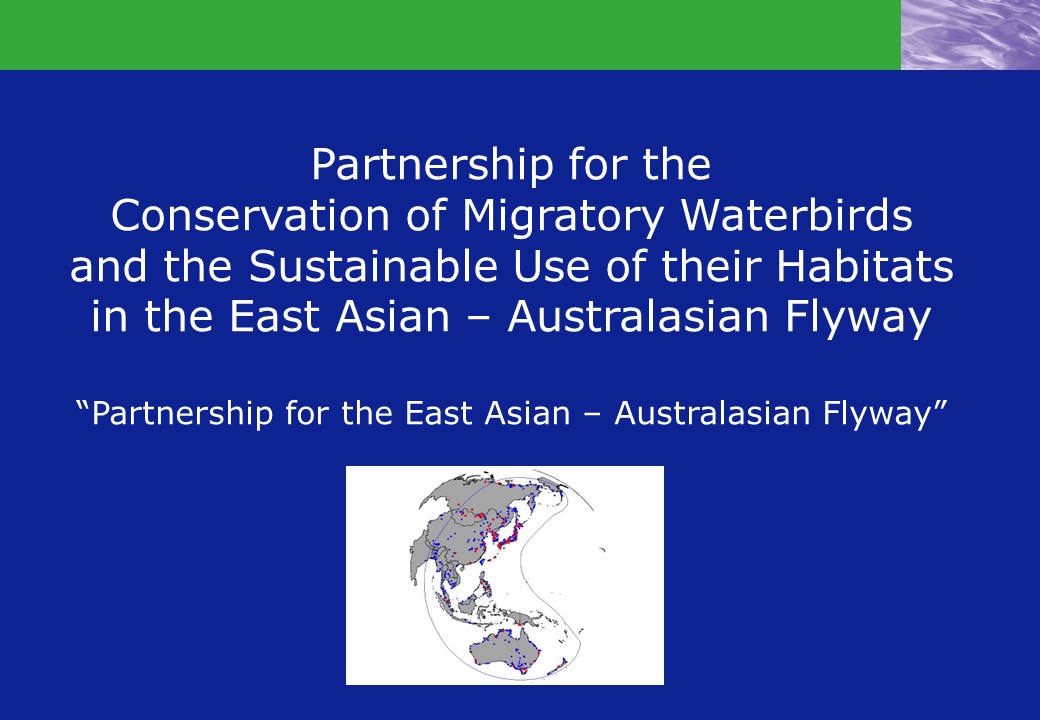Conservation of Shorebirds in the East Asian-Australasian Flyway - PowerPoint PPT Presentation
Title:
Conservation of Shorebirds in the East Asian-Australasian Flyway
Description:
Partnership for the Conservation of Migratory Waterbirds and the Sustainable Use of their Habitats in the East Asian Australasian Flyway Partnership for the ... – PowerPoint PPT presentation
Number of Views:90
Avg rating:3.0/5.0
Title: Conservation of Shorebirds in the East Asian-Australasian Flyway
1
Partnership for the Conservation of Migratory
Waterbirdsand the Sustainable Use of their
Habitats in the East Asian Australasian
FlywayPartnership for the East Asian
Australasian Flyway
2
Waterbird Migration in the East
Asian-Australasian Flyway
Breeding
- Annual migration of millions of waterbirds across
22 countries - Waterbirds dependent on a chain of wetlands
during migration - Conservation requires international cooperation
on management of a network of important wetlands - International, national and local frameworks to
coordinate and facilitate priority action
3
Conservation of migratory waterbirds
- Efforts in each country
- Integration among countries, with a
Whole-of-Flyway approach
4
Conserving Migratory Waterbirds A Strategic
Focus on Internationally Important Sites
5
A Flyway Site Network
Important Sites
6
Existing Network Sites Cranes, Anatidae,
Shorebirds
Country Important Network Sites
Sites USA 7 Russian Federation 81
10 Mongolia 16 5 Korea, D.P.R. 6 2 Korea,
Republic of 44 6 Japan 176 26 China 100
16 Vietnam 8 Cambodia 4 The Philippines 10
2 Thailand 16 1 Myanmar 8 Bangladesh 19 Malaysi
a 19 1 Brunei 3 Singapore 1 1 Indonesia 7
1 Papua New Guinea 2 1 Australia 124 15 New
Zealand 16 2 Totals (20 countries) 671 89
14 countries 89 sites participating in the
Migratory Waterbird Site Networks for Cranes,
Anatidae and Shorebirds
7
Migratory Waterbird Groups
Taxonomic Group English Name Gaviidae Loons Podi
cipedidae Grebes Phalacrocoracidae Cormorants Pel
ecanidae Pelicans Ardeidae Herons, Egrets and
Bitterns Ciconiidae Storks Threskiornithidae Ibi
ses and Spoonbills Anatidae Swans, Geese and
Ducks Gruidae Cranes Rallidae Rails,
Gallinules and Coots Heliornithidae Finfoots Jaca
nidae Jacanas Haematopodidae Oystercatchers Recu
rvirostridae Stilts and Avocet Glareolidae Prati
ncoles Charadriidae Plovers Scolopacidae Sandpip
ers Laridae Gulls, Terns and Skimmer
8
Updating the approach
- New key elements in the framework for
international commitment cooperation - Link shorebird conservation activities more
strongly to sustainable development and new
global agendas (eg Millennium Development Goals) - Be more relevant to the priorities of developing
countries - Develop greater commitment from all countries in
the Flyway, and - Build on the strengths developed in the Action
Plans to deliver a program for all migratory
waterbirds, recognising overlaps in the delivery
of capacity building and conservation activities.
9
EAA Flyway Partnership
Philosophy of the Partnership
Sustainable Development
Biodiversity
10
Flyway Partnership
A East Asian-Australasian Flyway Partnership -
recognised under the World Summit for Sustainable
Development (WSSD) and as a regional initiative
under the Ramsar Convention. The Flyway
Partnership provides a sign-on process for
government and non-government organisations - to
promote greater engagement and commitment to
collaborative work across the Flyway.
11
Flyway Partnership 2006 - 2010
Flyway (WSSD) Partnership Government, IGOs,
NGOs, Research Bodies, Business, Donors
International Collaborative Framework for
conservation action by governments, NGOs and
communities across the Flyway
- Implementation Strategy for Conserving Migratory
Waterbirds - Development and management of Network of Sites
- Awareness and Communications
- Increasing Knowledge Base
- Capacity development
- Priority Species
Network of Sites, managers, scientists, NGOs
12
Flyway Partnership Implementation
- Flyway Level
- Flyway Partnership Support Team (international
coordination and support) - National Level
- national partnerships in each country
- Site Level
- partnerships of stakeholders surrounding the
local sites
13
What does it mean for you?
- Flyway Partnership launch in Nov 2006 - replaces
the existing Migratory Waterbird Conservation
Strategy - All flyway countries and sites are invited to
join and participate in the new Flyway Site
Network - Existing sites are invited to form the new Flyway
Site Network - The Flyway Partnership will promote stronger
linkages with stakeholders in - Sustainable development and wise use of wetlands
- Habitat management techniques
- Education and awareness
- Waterbird science skills and knowledge
14
EAA Flyway Partnership
Partnership Launch - Indonesia, November 6-9
- NEED EVERY COUNTRY TO JOIN (National Government
Partners) - IGO and NGO Partners
- Corporate and Industry Partners
15
EAA Flyway Partnership
- 5. Potential Role for National Partners
- Develop and implement Projects nationally
sub-nationally - Coordinate National Partnerships (govt agencies,
NGOs, etc. - Optimise integration with international
strategies/ activity
16
Examples of Flyway collaboration
- Training in waterbird surveys monitoring
- Assisting the Asian Waterbird Census - population
estimates trends - Information exchange multiple networks, new
opportunities - Assistance in Education Awareness
- Sharing in Site Management Techniques
17
Partnership for the Conservation of Migratory
Waterbirdsand the Sustainable Use of their
Habitats in the East Asian Australasian
FlywayPartnership for the East Asian
Australasian Flyway
18
Elements of the Flyway Partnership
Partnership Text(The collaboration arrangement
for partners (especially important for Government
Partners)
Strategy (Priority actions for the Partnership)
Organisational StructureTo manage the
Partnership e.g. Meetings of Partners,
Implementation Committee, Technical Committee,
Working Groups/Taskforces)
Implementation Arrangements (Support Team, work
planning, funding, reporting national
partnerships establishing activities)
19
Partnership for the Conservation of Migratory
Waterbirdsand the Sustainable Use of their
Habitats in the East Asian Australasian
FlywayPartnership for the East Asian
Australasian Flyway






























